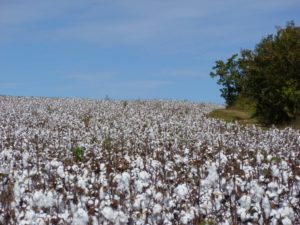Cotton is not only a fibre for the textile industry. Its sphere of influence goes much further: it is an essential economic factor for many farmers and workers in developing countries.
Lately, the International Cotton Advisory Committee (ICAC), Washington, presented the results of a recent assessment of the number of people employed in the cotton sector. In its estimates for employment in cotton growing in the 2015/16 season, the ICAC assumes around 200 million people. This maximum includes an estimate of more than 61 million cotton farmers. In India, more than 50 million people work in the production of cotton. Almost 55 million people are working in cotton production in Africa. This reaffirms the assessment of the Bremen Cotton Exchange, according to which the cotton industry has a high potential to create work and prosperity. This is especially the case in developing countries, where agriculture is the only means of earning for the majority of the population. The figures show how much of a responsibility the cotton-producing countries have to permanently achieve a satisfactory livelihood for the people in developing countries. However, cotton is being criticized very often regarding its ecological footprint, based on wrong or not updated data. In the long term the reputation of cotton will be damaged. This could lead to a shrinking cotton demand and at the same time cause damage to the livelihood of many people.
The figures show how much of a responsibility the cotton-producing countries have to permanently achieve a satisfactory livelihood for the people in developing countries. However, cotton is being criticized very often regarding its ecological footprint, based on wrong or not updated data. In the long term the reputation of cotton will be damaged. This could lead to a shrinking cotton demand and at the same time cause damage to the livelihood of many people.
“If cotton is criticised as not sustainable, this poses the question of facts and objective data. We observe that the discussion often takes place on the basis of obsolete or even incorrect information. Rapid internet research cannot replace discussion with international research, science and business. In cotton growing, this is simply a prerequisite for a reasonable assessment of the situation. Specialist knowledge and expertise are required”, stresses Elke Hortmeyer, Director of Communications at the Bremen Cotton Exchange.
This also applies to the recently published Sustainable Cotton Ranking 2017 by Pesticide Action Network UK, Solidaridad and WWF that cannot be considered representative for the textile sector as only 75 companies in the world had been interviewed.
The makers of this study criticise the large discrepancy between the supply of sustainable cotton and its actual usage by retailers, but are unable to name the reasons and do not actually define sustainability. It assesses a whole industry on the basis of only four initiatives and disregards the rest. The study quotes old numbers in pest management and irrigation, without acknowledging further developments, even in conventional cotton growing. Overall, the study lacks an economic assessment that includes the market pressures on cotton caused by competing synthetic textiles. As a result, this generally harms the reputation of cotton as a product – a product that serves as a livelihood of millions of farmers and, as a biodegradable fibre, is sustainable to its roots.
Cotton makes a significant contribution to reducing poverty and feeds millions of people in developing countries. This must not be undermined.
Press inquiries:
Elke Hortmeyer, Director Communication and international relations
tel.: +49 (0)421 3397016, email: hortmeyer@baumwollboerse.de

